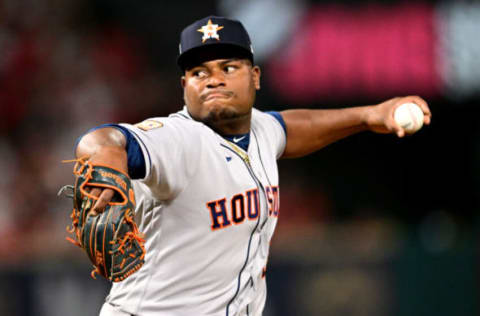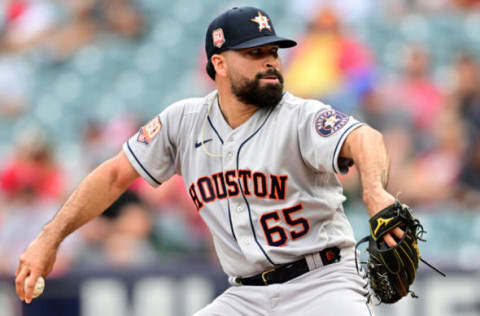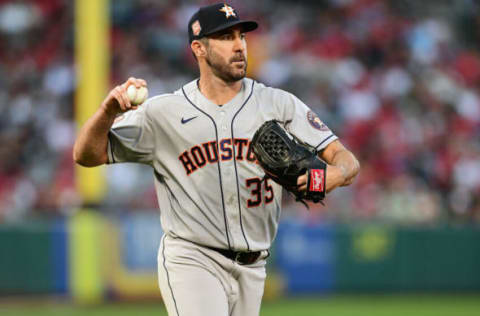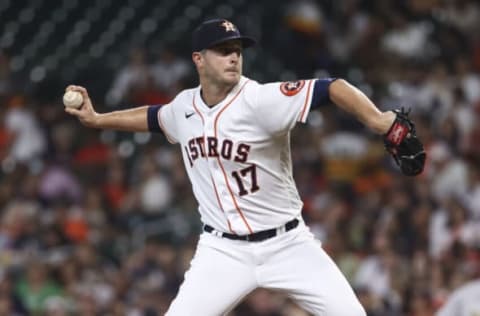Astros Rotation Evaluation after First Series

With four game averages, the Astros’ rotation solidified a 59 game score, 64.2 strike percentage and 4.9 pitches per out.
Depending on who you read or listen to, the Houston Astros rotation is either very deep or questionable and I agree that it depends on your point of view. On one hand, they’re deep enough that Cristian Javier can’t sniff the starter’s role, even with Lance McCullers Jr. on the shelf.
On the other hand, the ace is 39-years -old, coming off Tommy John surgery and the younger ace is out indefinitely. Given that divergence of opinion, I’ve decided to dive into the starts a little deeper and track each performance and the performance of the starters as a whole.
Three of the first four starts were above average to really good, with Framber Valdez’s opening day gem standing out as the top performance. From best to least best, here’s a review of the first four starts of 2022.

Framber Valdez – Game Score 75 | Strike % 64.3 | Pitches Per Out 4.2
In years past, Valdez battled control, with a career 4.0-walks per nine innings pitched. That wasn’t a worry on Opening Day as Valdez threw strikes on almost two-thirds of his pitches, while walking only one over 6.2 innings.
“I made adjustments during Spring Training and the biggest thing was attacking the zone, getting ahead in the count and attacking the batters,” he said. “It was a mental change, and that’s what I did.”
Game 1 @astrosCTH pic.twitter.com/jD6ngfoR6t
— Astronomic (@astronomic1) April 8, 2022
An efficient Valdez induced 11 ground balls (nine outs) in the 22 batters he faced, while striking out six Los Angeles Angels, inducing weak contact and granting only two singles.
It’s hard to imagine a better start to the season than this for Valdez as he out-dueled the much ballyhooed Shohei Ohtani and gave the Astros what they needed on Opening Day. If Valdez can maintain this level of control throughout the season, he’s going to be tough to beat.

Jose Urquidy – Game Score 57 | Strike % 68.1 | Pitches Per Out 4.8
Urquidy was in command giving up four hits, one being a bomb from former Astro Jack Mayfield in the second inning, but walking no one and throwing the highest percentage of strikes of the first four starters.
Over his 182.2 career innings Urquidy has only walked 1.7 batters per nine innings so the control and strike throwing shouldn’t be a surprise.
Game 4 @astrosCTH pic.twitter.com/KWzx4F5Bf3
— Astronomic (@astronomic1) April 11, 2022
Urquidy was also the second most efficient of the four, behind Valdez, with it taking an average of 4.8 pitches to record an out. The strikeout total of two means a lower game score, which is just one measure of how well the starter pitched.
In Urquidy’s case, the eyeball test tells you he kept the 18 Angels he faced at bay long enough for the offense to score a couple of runs and turn it over to the bullpen.

Justin Verlander – Game Score 61 | Strike % 58.8 | Pitches Per Out 5.3
Is the ace back? That seems to be the consensus among the Astros beat writers , and I’d agree for the most part with Verlander regularly hitting 95 mph and giving up only one run on a solo homer while getting zero run support.
Verlander gives up his share of solo home runs, that’s going to happen when you challenge major-league hitters pitch after pitch, so no worries there.
Game 3 @astrosCTH pic.twitter.com/MVbqNqIkiv
— Astronomic (@astronomic1) April 10, 2022
On the other hand, he walked three in five innings and had the lowest strike percentage of the first four starts, which is a little surprising.
It was his first major-league appearance in 624 days, so I’d say he did fine, though 80 pitches over five innings is not optimal efficiency. Having watched how this guy operates, I’d be willing to bet if he wasn’t coming off Tommy John surgery he’d have gone into the sixth and maybe even started the seventh.

Jake Odorizzi – Game Score 44 | Strike % 66.7 | Pitches Per Out 5.5
I’m not the biggest Odorizzi fan, but I thought he threw the ball well for the most part. The 66.7% strike ratio was refreshing, but Odorizzi was unable to make it past the fourth inning. This was Jeremy Peña’s night and the Astros blasted the ball all over and out of the park, so the fact that they had to use six pitchers in a blowout win is overlooked.
Game 2 @astrosCTH pic.twitter.com/CSSlOPCQVF
— Astronomic (@astronomic1) April 9, 2022
Simply put, four innings in April is not a big deal, but as the year goes on and the bullpen appearances pile up the Astros need more than four innings from Odorizzi or any starter for that matter.
Odorizzi didn’t walk anyone, which is a plus, but he gave up six hits to the eighteen batters he faced and there were a lot of fly balls and line drives. I’m still not convinced Odorizzi belongs in this rotation, but it’s only one start in a long season and the Astros won the game and I don’t want to over react.
dark. Next. Joe Maddon believes Angels and Astros are “very close”
Astros Orbit:
The following prospects were released April 1: OF Jesus Liranzo, SS Sean Mendoza, SS Jose Mendoza, SS Yorbin Ceuta and RHP Jherson Pereira.